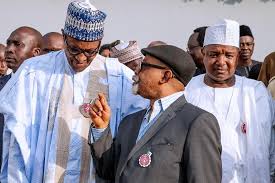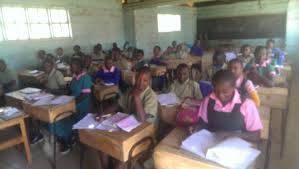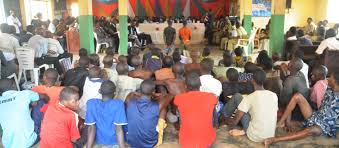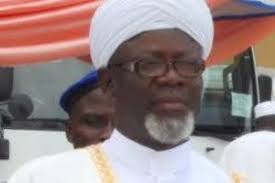Blog
-
Budget Failures Responsible for Low Productivity of Workers-AWC
- On 27/05/2019
- In News
 The absence of budgetary provision for training and retraining programmes for workers in Nigeria in the last four years has been fingered as one of the impediments to good governance.
The absence of budgetary provision for training and retraining programmes for workers in Nigeria in the last four years has been fingered as one of the impediments to good governance.This is the position of the All Workers Convergence(AWC) who made this known through its National Coordinator, Comrade Andrew Emelieze.
''Generally, workers are complaining in all aspects that affects productivity, including training, retraining and manpower development which ahs been at its lowest ebb in the last four years.This is so because in the last four years we have been having budget failures and the budget has not been fully implemented. Therefore funds for the training and retraining of workers might not be readily available based on budget non-performance, which of course has affected productivity and the psychology of workers, coupled with the gravity of low pay. Workers are generally ill motivated'', Comrade Emelieze opined.
-
Financial Autonomy for LGs Will End State Governors’ Mismanagement-Prof Olagoke
- On 23/05/2019
- In News
 The Nigeria Financial Intelligence Unit(NFIU) recently pronounced that states would no longer control the funds of Local Governments in the country beginning from 1 June, 2019.
The Nigeria Financial Intelligence Unit(NFIU) recently pronounced that states would no longer control the funds of Local Governments in the country beginning from 1 June, 2019.However, state Governors insist that the NFIU’s action is illegal, but a cross section of Nigerians are of the opinion that the action is timely and would enable development get to the grassroots unhindered.
In this interview, the Spiritual Head, Founder and Grand Imam of Shafaudeen-in-Islam Worldwide, Prof. Sabitu Olagoke opines that autonomy for the Local Governments would end wastage and mismanagement of finances of Local Government funds by state Governors.
Excerpts :
What is your reaction to the pronouncement of the NFIU Local Government funds ?
The pronouncement of the NFIU is long overdue, in view of the fact that the financial scam we are trying to prevent through the states’ control of the Joint accounts of States and Local Governments, only resulted in the impoverishment of the Local Governments as well as the people at the grassroots.
The superpower approach of many state Governors, with the attendant wastage of resources not been directed to the development concern of the grassroots must have informed the NFIU’s pronouncemnt.
Equally, the bureaucratic process leading to the unnecessary delays as well as some hanky panky by the National Assembly and their probable collaboration with the Governors would have informed the Federal Government’s decision to separate the NFIU to do a perfect job.
Naturally, the clamor for the autonomy of Local Governments ought to have been done in the spirit of the need for the development of the grass roots, this is for rural integration to get a boost. The Local Government is closer to the people and this tier of government is easier to approach by the ordinary man.
However, the culture of running governance as a personal empire, arguments would ever surface against the move by the Governors, whose meeting under the umbrella of the Nigeria Governors Forum have never been known to be on the side of the masses, whose rights they regularly and easily trample upon.
The state Governors should realize that their annual budget should be within the limits of what the constitution assigns them and projects to be executed must be such to cover their specified areas of jurisdiction.
All over the world most especially in the countries that are known to be fully developed such as the United Kingdom as well as the french speaking nations like Cote Ivoire, the Local Authorities take charge of development at the grassroots, with visible impact on the lives of the people, making their nations to follow the normal curve of economic class-Low, Middle and High, but in Nigeria, the middle class has gone into extinction, leaving us to the mercy of the low, high and outrageously and extremely very high in an environment of poverty, destitution, hunger and diseases, with every matter of development been politicized.
Structurally in Nigeria, a lot of things are wrong and they have been there for so long, mainly because the masses are highly marginalized and incapacitated. This has made the politicians to lose focus on development, while they chase the shadows of self aggrandizement, illegal acquisition of wealth with low records of physical symbol on record of good performance while in office.
All the masses could reap as dividends of Democracy is mere propaganda to cajole the people . They spend three months in office as political office holders, all they acquire during this period would be fatter than the gratuity of retired Professors, who must have served the nation for almost 40 to 50 years.
With the NFIU’s pronouncement, sanity would be introduced in the financial transactions of the Local Governments. Also one would hope that the institutional committees such as the ACTU will equally spring into action to check the excesses of principal officers and surrogate allied officers in milking dry various institutions. For example there is a need for Nigerians to know the sources of the funds of some civil servants building Malls and edifices in Abuja and Lagos and even buying houses abroad.
I have seen Universities and Polytechnics, where some people appointed as Bursars thank their their luck in their religious houses and with all fanfare throw parties as if to say their salaries would be more than that of the Senators.
I have equally seen Registrars building palaces of complexes in different cosmopolitan towns and floating event centers as well as hotels spreading across hectares of land, but without having genuine sources of funds from any of their established business conglomerate.
The owners of these, reflect the rot in the Ministries, Departments and Agencies, in a land where we are fighting corruption. We must not lose sight of this.
To make the financial autonomy of Local Governments to stand firm, there is the need to have a very effective network of anti-graft measures to checkmate possible excesses of Local Government Principal Officers from relaunching orgies of financial recklessness.
It is not enough to make a law or effect a change, it is necessary to monitor critically, the workings in order that the Local Government does not again deviate from the expected service target of effecting development positively, with welfare of the people as a priority.
-
Foundation Feeds Families in Seychelles
- On 16/05/2019
- In News
 Seychelles Sustainable Tourism Foundation(SSTF) in continuation of its "Don't Waste, Eat!" food waste reduction programme' has distributed over 200 kilogrammes of food to over 35 families.
Seychelles Sustainable Tourism Foundation(SSTF) in continuation of its "Don't Waste, Eat!" food waste reduction programme' has distributed over 200 kilogrammes of food to over 35 families.The "Don't Waste Eat!" food waste reduction programme kicked off in July 2018 and is facilitated by the Seychelles Sustainable Tourism Foundation, (SSTF) in collboration with Betterfly Tourism --a software publisher for tourism profession.
The programme serves to equip staff with necessary skills to measure and monitor food waste, provide hotels with a platform that facilitates monitoring of cost savings and food waste reduction.
According to the SSTF Project Officer, Rosetta Alcindor. the Foundation is committeed to putting smiles on the faces of families.
"There is more to a food donation than what we usually think. We are not only providing food for the community and diverting good food from the landfill, but we are also putting smiles on families' faces.''
"Though a lot of the products are buffet leftovers or had reached their best before date, they are still good for consumption.''
"As the food is donated, it reduces the demand for importation of food products on the market as families now consume what they were donated, hence avoiding CO2 emissions along the supply chain," Alcindor stated.
Families received vegetables, fruits and other food products which included pastries, cakes and bread. The donations were made by SPAR supermarket and a number of hotels which are members of the Seychelles Hospitality and Tourism Association such as Alphonse Island Lodge, Constance Ephelia, Bravo Restaurant, H Resort and Kempinski Seychelles Resort.
-
Kenya Govt Releases Funds for Free Education
- On 10/05/2019
- In News
 The Kenyan Government has made available Sh14.5 billion to Primary and Secondary schools in the countryin furtherance of its policy on free education.
The Kenyan Government has made available Sh14.5 billion to Primary and Secondary schools in the countryin furtherance of its policy on free education.This disclosure was made by the Education Principal Secretary, Dr. Bellio Kipsang who gave the breakdown as Sh10.8 billion to secondary schools and primary schools for Sh3.65 billion.
"The funds have started to reflect in schools bank accounts," Dr. Kipsang disclosed.
Dr Kipsang said the funds will enable principals and headteachers to serve learners effectively, while stressing that the funds were transmitted through the National Education Management Information System (NEMIS) unlike in the past when the Ministry of Education relied on the information that principals of secondary schools provided.
The government makes available Sh22, 244 annually for every secondary school student and Sh1, 420 for each pupil in primary school.
In his views, Education Cabinet Secretary Prof George Magoha said NEMIS will facilititate the provision of quality, reliable and timely education statistics to enrich the government's planning processes.
"The unique identification issued to schools, learners and all members of staff in our institutions of learning will improve the management of resources in the education sector and allow all efforts to be directed at achieving quality education for sustainable development . ''
"Through this system, education sector players will get to know the status of education in regard to access, quality, equity, relevance, efficiency as well as institutional development," said Prof. Magoha
-
Govt Should Review Legislation on Convicts-Oyo Controller of Prisons
- On 08/05/2019
- In News
 The Federal Government has been called upon to review the legislation stipulating that ex-convicts cannot be employed by the three tiers of government due to their status.
The Federal Government has been called upon to review the legislation stipulating that ex-convicts cannot be employed by the three tiers of government due to their status.This call was made on Wednesday by the Oyo state Controller of Prisons, Mr. Tosin Akinrujomu in a chat with Poverty Line in Ibadan, Nigeria.
''There is a clog in the wheel and it is the government legislation against convicts. A convict cannot be employed by the Federal, State and Local Governments. For example a convict released into the society, such as a Professor cannot go back to the university again. The tendency is for such a person to go back to crime. Government should look into this'', Mr. Akinrujomu stated.
The Controller appealed to government to make more funds available to the Prisons Service saying '' government should look into the funding of prisons. The prisons are growing in arithmetical progression while crime is growing in geometrical progression. Funding for the prisons should be improved. Government should also look into the Judiciary and Police in terms of funding because we work hand in gloves.''
-
Liberian Woman Accuses Police of Covering Up Son's Murder
- On 07/05/2019
- In News
A 50 year old Lberian woman has accused the Police of covering up the murder of her son.
Madam Elizabeth Kamara dismissed police investigation report that her son,Exodus S. Kamara, was mobbed to death by an angry crowd, while insisting that the murder of her son was premeditated.
The deceased lost his life April 24, 2019, on the Smythe Road, in Sinkor, Monrovia.
 "Cllr. Johnson and her security officers took my son in her compound where they beat him to death, and later dragged his body outside of her fence, and dumped it on the street like a dog," Madam Kamara alleged in her statement to reporters on Thursday, May 2, at the grounds of the Temple of Justice on Capitol Hill''.
"Cllr. Johnson and her security officers took my son in her compound where they beat him to death, and later dragged his body outside of her fence, and dumped it on the street like a dog," Madam Kamara alleged in her statement to reporters on Thursday, May 2, at the grounds of the Temple of Justice on Capitol Hill''.Cllr. Johnson is reported to be an employee of the Dean and Associates Law Firm owned by Justice Minister, Cllr. Frank Musa Dean.
Madam Kamara made this allegation when she e interacted with newsmen at the Temple of Justice after two of Cllr. Johnsons' private security guards, Junior Sayee and Abraham Gardour of the Alarm Security Service, were arraigned before the Monrovia City Court on a charge of negligent homicide brought against the pair by officers of the Liberia National Police (LNP).
Kamara said she was not satisfied with the police investigative report that did not charge Cllr. Johnson with murder, "because I feel she was the brain behind my son's death."
Kamara was arrested at Cllr. Johnson's residence prior to his death
The police report had earlier claimed that the victim (Kamara) was arrested by the defendants, while stealing planks in Cllr. Johnson's fence. According to the report, an angry crowd forcibly took him away from the hands of the two security officers.
Thereafter, his lifeless body was found lying unconscious on the Smart Road, Vai Town Community.
However, Madam Kamara tearfully claimed that Cllr. Johnson employed her son as a driver, but was later dismissed due to misunderstanding that erupted over unpaid salary.
"My son was not a criminal, but the one who tried to collect his just pay from Cllr. Johnson who had refused to pay his salary when she ordered her boys to beat him, a situation that led to his death," Madam Kamara stated while weeping.
-
Govt Should Intensify Battle Against Piracy-Authors
- On 06/05/2019
- In News
 The Oyo state chapter of the Association of Nigerian Authors(ANA) has appealed to the Federal Government to curb the activities of book pirates in the country.
The Oyo state chapter of the Association of Nigerian Authors(ANA) has appealed to the Federal Government to curb the activities of book pirates in the country.The ANA made this appeal recently, through its Chairman Mr. Funsho Omotosho at an event to commemorate the World Book and Copyright day in Ibadan, Nigeria.
Nigerian authors are not business people, only a few of us earn our living through writing. We have other things we do. Our appeal to government through the Nigeria Copyright Commission is for government to intensify the battle against book piracy. Without remuneration coming, the authors will languish’’, Mr. Omotosho disclosed.
In her remarks, the Zonal Director of the Nigeria Copyright Commission, Mrs. Bisi Ogundiran called for concerted efforts among stakeholders to eradicate book piracy.
‘’We must jointly say no to piracy. Pirates eat where they have not sown and they kill rights owners. As Teachers we must ensure that all those books supplied to our schools are from the right source and are original, so that the benefits would go back to the rightful authors and publishers. We don’t want our authors and publishers to die before their time. Please do not patronize pirates, they are economic saboteurs, please do not encourage book piracy’’, Mrs. Ogundiran warned.
-
Nigerians Should Make Use of the Ramadan Fast to Cleanse Themselves of All Evil-Gran Imam Shafaudeen-in-Islam Worldwide
- On 04/05/2019
 As Muslim faithful prepare for the commencement of the 30 day Ramadan fast across the globe, concerned citizens in different countries are of the opinion that the fasting period should also be used by all to fervently pray for members of outlawed groups and their sponsors who have derailed and are responsible for the unabating rate of kidnappings, killings, ritual killings, armed robberies, violence and other crimes in several countries of the world, to retrace their steps and embrace the teachings about God.
As Muslim faithful prepare for the commencement of the 30 day Ramadan fast across the globe, concerned citizens in different countries are of the opinion that the fasting period should also be used by all to fervently pray for members of outlawed groups and their sponsors who have derailed and are responsible for the unabating rate of kidnappings, killings, ritual killings, armed robberies, violence and other crimes in several countries of the world, to retrace their steps and embrace the teachings about God.The citizens are hopeful that the fasting period shall usher in a new era of peace and stability globally. In this interview, the Founder, Spiritual Head and Grand Imam of Shafaudeen-in-Islam Worldwide, Prof. Sabitu Olagoke calls on Nigerians to use the fasting period to cleanse themselves of evil and cultivate integrity based behaviors. Excerpts
The Ramadan fast is only some few days away, what is your message to the Muslim Faithful ?
Nigerians generally need to change their attitude towards all festivals and seasons, since in most cases they declare holidays which always have economic implications on the nation.
Suffice it now to say that such holidays need to be justified through the benefits of the exercises for which the holidays were always declared, be it traditional, Christian or Muslim.
For the Ramadan session, the nation starts to benefit a lot if the design and the purpose are respected accordingly, because the goal for which it is divinely designed is to educate and reform the animal called man; to raise his bestial status into that of a person with high level of integrity.
The expectation is for all Muslims to follow the behavioral objectives which is centered on achieving the culture of fear of God-which happens to be the bedrock of attitudinal reform towards achieving the four codes of life based on the positive mindset.
 The adherents,during and after observing the Ramadan fast, must assume a permanent characteristics of positive self image where he or she sees himself or herself as been ever relevant in the scheme of selfless service, community peace and nation building.
The adherents,during and after observing the Ramadan fast, must assume a permanent characteristics of positive self image where he or she sees himself or herself as been ever relevant in the scheme of selfless service, community peace and nation building.He must equally have that sense of confidence to individually perform tasks without supervision and with an endowed gift of a prime mover team work spirit.
Thirdly, he or she must become an epitome of self esteem, who is expected to role model an established code of conduct with overbearing measure of discipline and integrity.
The fourth, achievable must, must dominate exemplary life style through positive mental attitude for ease of relocation. Such a person is never found wanting when it comes to the issue of trust, accurate and precise decisions, before putting up any action.
Such a person naturally will be awesome in identifying and recommending solutions, through his or her spiritual endowments, which bothers on social assignment activation and articulation.
 Unfortunately, going by the past antecedents of Ramadan fasting exercises, generally, it had always been a case of annual ritual of ceremonial importance contrary to the designed goal of Saomu.
Unfortunately, going by the past antecedents of Ramadan fasting exercises, generally, it had always been a case of annual ritual of ceremonial importance contrary to the designed goal of Saomu.Ramadan fasting which is to facilitate the establishment of the culture of the fear of God, which must reflect in using due process in procurement for the purpose of transparency and accountability in management, administration and good governance.
Ramadan fasting remains a spiritual Doctor to mankind, an antidote for corruption and indiscipline and a reliable solution to the best way to achieve justice in the system to avoid disaffection and violence, equity in material distribution through common availed opportunity to have access, which acquisition of marginalization to promote inclusive society, in order that the individual and the nation would be able to have functional Democracy with full benefits for sustainable development, peace and security.
We shall continue to cheat ourselves as mankind, if we fail as individuals and collectively as a nation, to goal set with adequate sensitization effect on the seriousness and messages of the Ramadan fasting exercise.
We need the same attitudinal change and focus towards availed opportunities of seasons and festivals from all facets of our natural life-tradition, religion and social.
Read Also : 1.7 Million to Experience Food Shortage in Somalia-UN @ http://1stguide.over-blog.com

